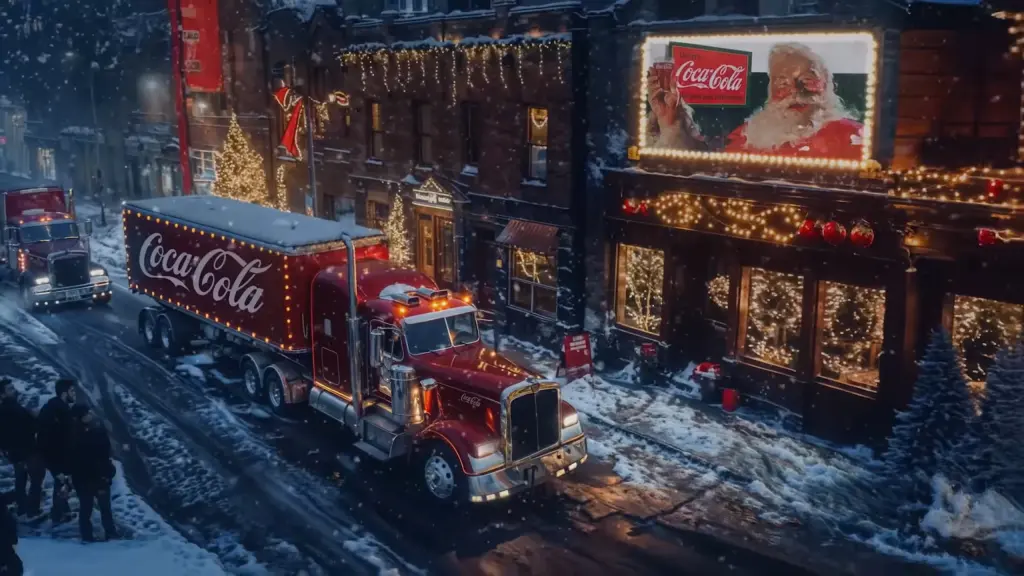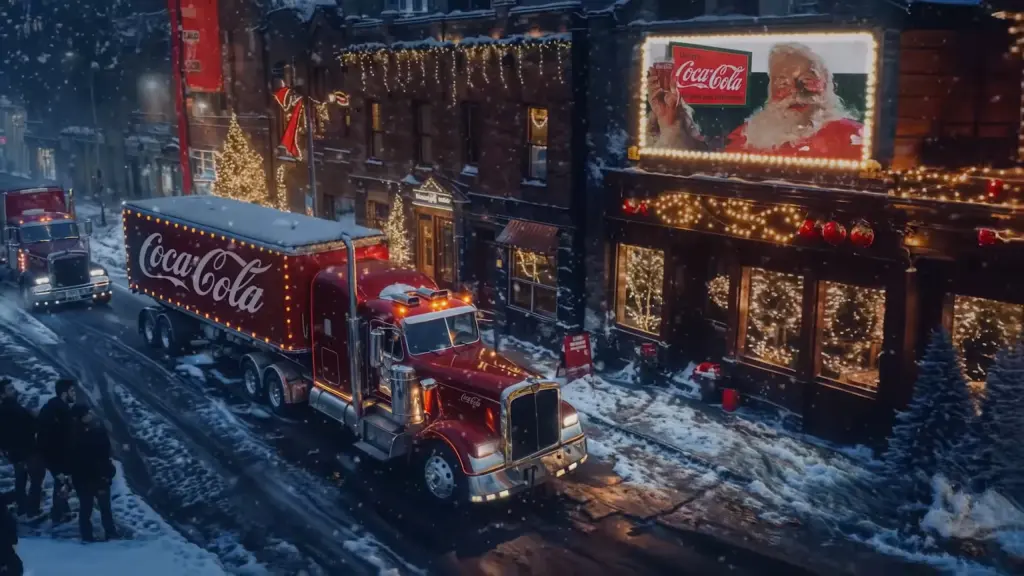Coca-Cola’s latest attempt to blend nostalgia with cutting-edge technology has sparked a heated debate. Released as a modern twist on its iconic 1995 “Holidays Are Coming” ad, the new AI-generated Christmas commercial was meant to celebrate tradition while showcasing innovation. Instead, it has been widely criticized as a “dystopian nightmare,” with viewers questioning the decision to rely on artificial intelligence for a piece so closely tied to holiday sentimentality.

What Was Coca-Cola’s Vision?
The commercial, created using Coca-Cola’s proprietary “Real Magic AI” platform, features the signature red Coca-Cola trucks making their way through a snowy town adorned with holiday decorations. The trucks deliver bottles of the beverage, set against a festive backdrop, aiming to evoke the same warmth and cheer associated with the original campaign.
Coca-Cola intended the project to highlight the potential of AI in creative storytelling. According to the company, the ad was a collaboration between human creativity and AI technology, designed to bring a new perspective to a cherished tradition. However, the execution fell flat, leaving viewers unimpressed and, in some cases, disturbed.
The Backlash: Aesthetic and Ethical Concerns
Visual Critiques
Viewers quickly took to social media to express their disappointment. Many pointed out glaring issues in the visuals, including awkward transitions, static truck wheels, and unrealistic lighting. “It feels off,” said one commenter on Twitter. “The charm and magic of Coca-Cola’s classic ads are completely missing here.” The absence of Santa Claus, a staple of Coca-Cola’s Christmas branding, also puzzled many fans.
The visual glitches and lack of warmth left audiences questioning whether the commercial was rushed or if AI is simply not yet ready to handle the emotional nuances required for such a project.
Ethical Implications
The controversy extends beyond poor aesthetics. Critics argue that relying on AI undermines the artistic integrity and labor of human creators. By outsourcing much of the creative process to technology, Coca-Cola has inadvertently contributed to fears about the future of creativity and job security in industries traditionally dominated by human ingenuity.
One social media user encapsulated the sentiment: “AI might be fast, but it lacks soul. Coca-Cola has taken something iconic and turned it into something soulless.”
Coca-Cola’s Defense
Coca-Cola responded to the criticism, stating that the ad was intended to showcase the possibilities of AI while still incorporating human oversight. The company emphasized the collaboration between human storytellers and generative AI to create a modern holiday ad.
They also highlighted the cost-effectiveness and speed of using AI in production. “Generative AI offers a faster and more efficient way to bring ideas to life,” Coca-Cola explained in a press release. While the company remains optimistic about AI’s potential, this explanation did little to appease critics, many of whom view the commercial as a misstep.
The Growing Role of AI in Creative Industries
Coca-Cola’s commercial is part of a broader trend of companies experimenting with AI in marketing and media. AI tools are increasingly being used to create advertisements, music, and even films. While the technology offers efficiency and scalability, its application often raises concerns about quality and authenticity.
Balancing Innovation with Tradition
Coca-Cola’s mistake may lie in the delicate balance between embracing innovation and respecting tradition. Holiday advertisements, particularly those from brands like Coca-Cola, are steeped in nostalgia and emotional resonance. By choosing an AI-first approach, the company may have underestimated the importance of human touch in connecting with audiences on a sentimental level.
Consumer Expectations
Modern consumers value authenticity. They appreciate innovation, but not at the cost of emotional connection or quality. Coca-Cola’s commercial, despite its intentions, failed to meet these expectations, leading to a backlash that could affect the brand’s image.
Lessons for the Future
While the commercial’s reception was overwhelmingly negative, it serves as a valuable case study for brands exploring the use of AI in creative endeavors. Here are some takeaways:
- Quality Over Speed: AI can streamline production, but it shouldn’t compromise the quality or emotional depth of the final product.
- Consumer-Centric Focus: Understanding audience expectations is crucial. Brands must ensure that innovation enhances, rather than detracts from, the consumer experience.
- Transparency in Execution: Being upfront about how AI is used can help manage expectations and build trust.
Is AI Ready for Creative Storytelling?
The Coca-Cola ad highlights both the promise and limitations of AI in creative fields. While AI is undoubtedly a powerful tool, it currently lacks the ability to replicate the emotional and artistic nuances of human creators. Projects that rely heavily on AI without sufficient human intervention risk alienating audiences, as demonstrated by the backlash against this campaign.
Conclusion
Coca-Cola’s AI-generated Christmas ad, intended as a celebration of both tradition and technology, has instead become a cautionary tale. By prioritizing innovation over the emotional connection their audience cherishes, the company missed the mark, sparking widespread criticism.
As AI continues to evolve, brands must tread carefully, ensuring that technological advancements serve to enhance—rather than overshadow—their creative storytelling. Coca-Cola’s misstep underscores the importance of balancing progress with authenticity, a lesson that will undoubtedly shape future endeavors in AI-driven marketing.

